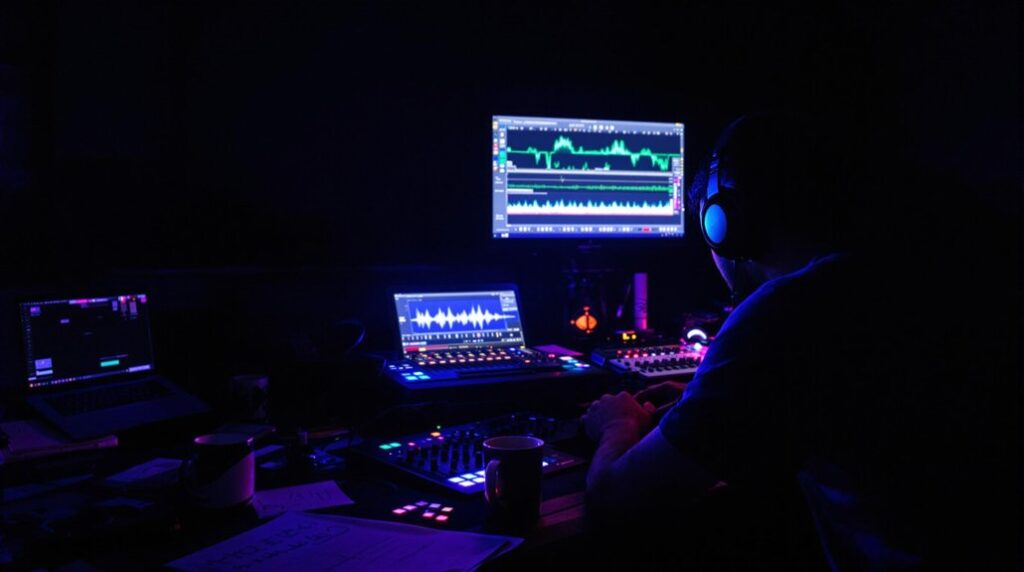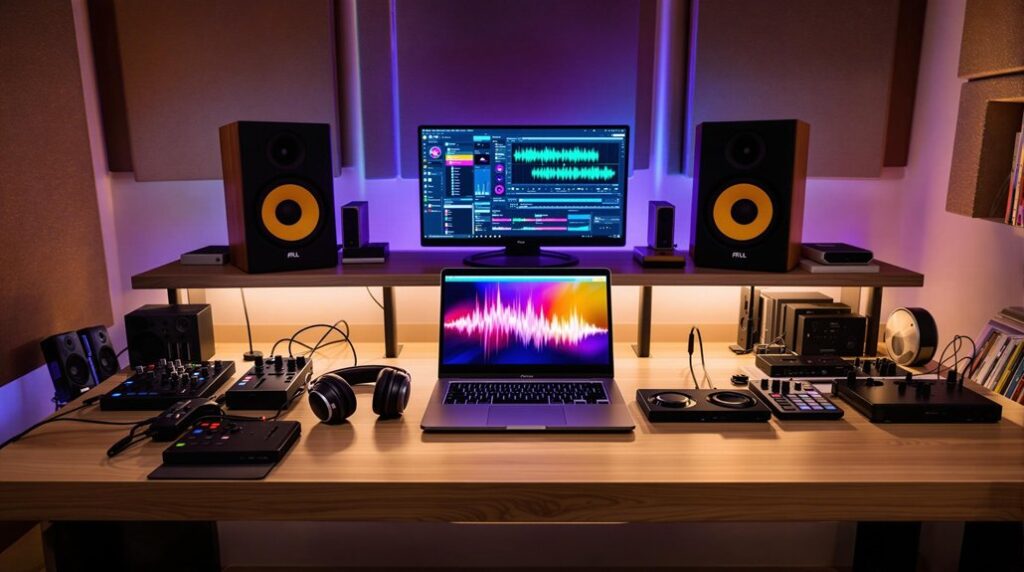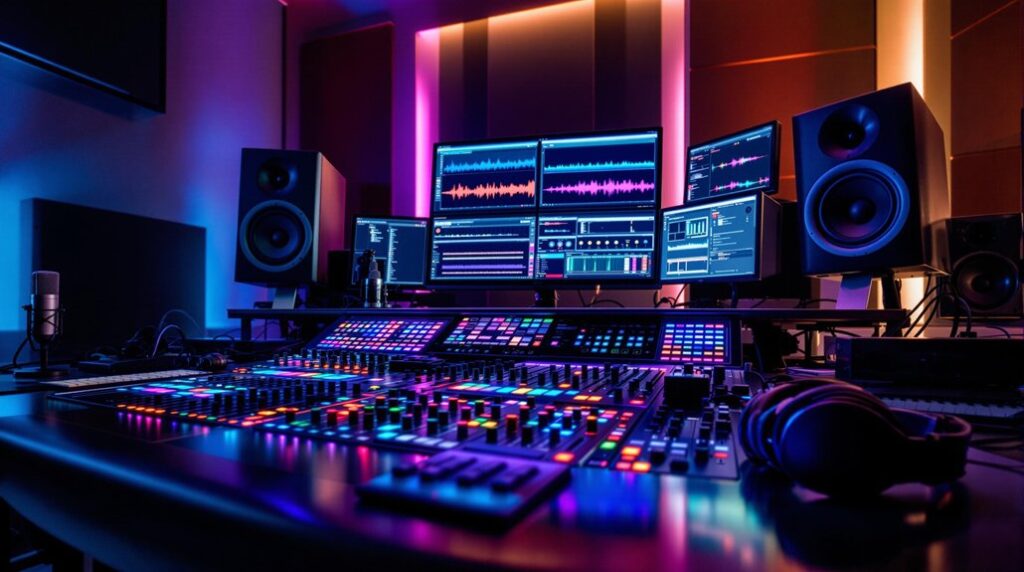Balancing DIY mixing against professional services involves key trade-offs. You’ll save on costs with DIY but might compromise on audio quality due to lack of specialized tools. DIY offers full creative control to experiment with sounds, though at the risk of a less polished mix. Professional studios provide superior gear and acoustically treated spaces, ensuring high-quality results. However, DIY requires significant time investment and expertise to master technical aspects like EQ settings. Professionals, leveraging years of industry experience, deliver superior mixes more efficiently. Objective feedback from pros can highlight issues you might miss. Explore further to optimize your choice.
Key Takeaways
- DIY mixing offers cost savings but risks compromising audio quality due to lack of specialized tools.
- Professional mixing ensures superior audio quality, justifying higher costs with expert technical skills.
- DIY mixing allows full creative control and experimentation but may struggle to achieve a polished sound.
- Professional studios provide high-end equipment and acoustically treated rooms for enhanced sound quality.
- DIY mixing requires significant time and learning, while professionals deliver a superior mix quicker with industry expertise.
Cost Savings Vs. Quality
When weighing the pros and cons of DIY mixing versus hiring a professional, you must consider the significant cost savings of DIY methods against the potential compromise in audio quality. DIY mixing can eliminate the need for costly professional services, freeing up resources for other aspects of your project. However, this cost-saving approach often comes with trade offs. Without the expertise and specialized tools of a professional mix engineer, there’s a risk of sound compromise.
Engaging in DIY mixing allows for substantial skill development, enabling you to understand the intricacies of audio engineering. Yet, the investment trade offs are clear. While you save money, the time and effort required to achieve a professional-level mix may be substantial, and the end result mightn’t match industry standards.
Professional mixing services, on the other hand, justify their higher costs with superior audio quality. Hiring a professional provides access to advanced gear and experienced ears, minimizing the risk of sound compromise. This makes them a sensible investment for those prioritizing high-quality mixes.
Balancing budget constraints with your desire for pristine audio is important in making the right decision between DIY and professional mixing.
Creative Control
Opting for DIY mixing grants you unparalleled creative control, enabling you to experiment freely with various sounds and effects without external constraints. This flexibility allows you to shape your mix to perfectly align with your artistic vision. You can spend as much time as needed on each element, tweaking EQs, playing with reverb, and manipulating dynamics to achieve the exact sonic landscape you envision.
This degree of experimentation is often restricted in professional mixing due to time constraints and the mixer’s established workflow.
However, this freedom comes with potential pitfalls. Without the seasoned expertise of a professional mixer, you might encounter limitations in achieving a polished, consistent sound across your tracks. The risk of ending up with a mix that sounds muddy or unbalanced is higher if you lack technical proficiency or a well-trained ear.
Therefore, DIY mixing is ideal if your primary goal is to maintain artistic control and experiment with different audio elements. But for a more streamlined, consistent mix, professional mixing might be more suitable.
Balancing your need for creative freedom with the potential limitations in technical execution is essential in deciding the best approach for your project.
Equipment and Resources
Investing in DIY mixing often means you’ll need to allocate funds for essential gear like a reliable computer, DAW software, studio monitors, an audio interface, and a variety of plugins. The digital world offers limitless possibilities, but it’s important to understand the trade-offs between analog vs. digital gear.
Digital tools in a home studio provide flexibility and a broad range of effects, but they can lack the warmth and depth that high-end analog processing delivers. When comparing home vs. studio setups, it becomes clear that professional studios boast superior resources. High-end mixing consoles, outboard gear, and analog processors enhance sound quality and offer a tactile workflow that digital interfaces can’t replicate.
These tools, combined with acoustically treated rooms, create a pristine audio environment, allowing for more accurate mixing decisions. In contrast, DIY setups are often limited by budget and space constraints. While modern plugins are impressive, they require a solid understanding of their capabilities to optimize results.
The ability to experiment with these tools is a major advantage, but it demands time and a steep learning curve. Therefore, equipment and resources play a pivotal role in the distinction between DIY and professional mixing.
Time and Expertise
Mastering the art of mixing demands a significant investment of time and expertise, whether you’re a DIY enthusiast or a seasoned professional. For DIY mixers, the learning curve is steep, requiring you to familiarize yourself with various plugins, EQ settings, and dynamic processors. This process often involves trial and error, which can be both time-consuming and frustrating. Efficiency becomes a challenge as you navigate through numerous tutorials and experiment with different sounds and effects to achieve the desired outcome. Without precision, your mixes may end up muddy or unbalanced, lacking the clarity and punch of professionally mixed tracks.
On the other hand, professional mix engineers bring years of industry knowledge and technical expertise to the table. They’ve honed their skills through countless hours of practice and have developed an acute sense of precision. This expertise translates to higher efficiency, allowing them to achieve superior mix quality within a shorter time frame. When you hire a professional, you’re not just paying for their time; you’re investing in their ability to deliver a polished, radio-ready mix.
Balancing your time investment and skill level is vital in deciding whether to tackle mixing yourself or leave it to the pros.
Feedback and Objectivity
Harnessing the impartial feedback and objectivity of a professional mix engineer can greatly enhance the overall sound quality of your mix. When you mix your own tracks, it’s easy to become too attached to certain elements, potentially overlooking flaws. Professional mix engineers provide impartial opinions and a critical assessment of your work. They bring a fresh set of ears to the table, capable of identifying and fine-tuning aspects you might miss.
| DIY Mixing | Professional Mixing |
|---|---|
| May lack objectivity | Provides unbiased feedback |
| Harder to identify potential issues | Offers critical assessment |
| Subjective perspectives | Fresh perspective on the mix |
| Potential for unbalanced mix | Ensures balanced, cohesive final result |
| Limited technical expertise | Advanced technical skills and knowledge |
A DIY approach might suffer from subjective biases, making it challenging to spot deficiencies. Conversely, a professional mix engineer’s objectivity leads to a more balanced mix. Their critical assessment ensures that each element sits perfectly within the soundscape. This impartiality is fundamental for achieving a polished and professional-sounding mix. Ultimately, while DIY mixing has its merits, engaging a professional mix engineer can provide the clarity and objectivity necessary for superior sound quality.
Frequently Asked Questions
Is Professional Mixing Worth It?
Yes, professional mixing’s worth it. When you do a cost comparison, the quality differences are striking. Professional mix engineers use analog processing and mixing consoles, ensuring your music achieves a superior, transformative sound that DIY efforts often can’t match.
Should You Master Your Own Mix?
Mastering your own mix in a home studio with audio plugins can save costs but requires mastering proficiency. If you’re dedicated to learning and have the right tools, self-mastering can yield professional results, though it demands significant expertise.
How Much to Have a Song Professionally Mixed?
Considering your budget, professional mixing costs range from $300 to $1,200 per song. Industry standards dictate higher rates for renowned engineers. Package deals and project complexity can also influence the final price, ensuring a polished, radio-ready sound.
Is Mixing and Mastering the Same as Producing?
Mixing and mastering aren’t the same as producing. Producing involves creative direction and sound design, while mixing and mastering require technical expertise, focusing on audio equipment to balance tracks and enhance overall sound quality for distribution.
Conclusion
Ultimately, choosing between DIY mixing and hiring a professional hinges on your priorities. If cost savings and creative control are paramount, DIY is your route.
However, professional mixing offers superior quality, access to high-end equipment, and invaluable expertise. Consider your project’s scope and your own skill level.
Remember, while DIY allows for a personal touch, a professional mixer provides polished, industry-standard results. Weigh these factors carefully to make the best decision for your music.




